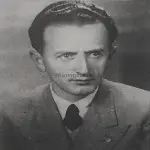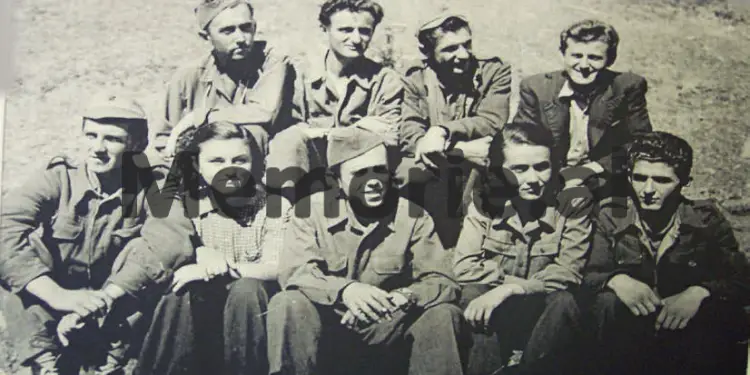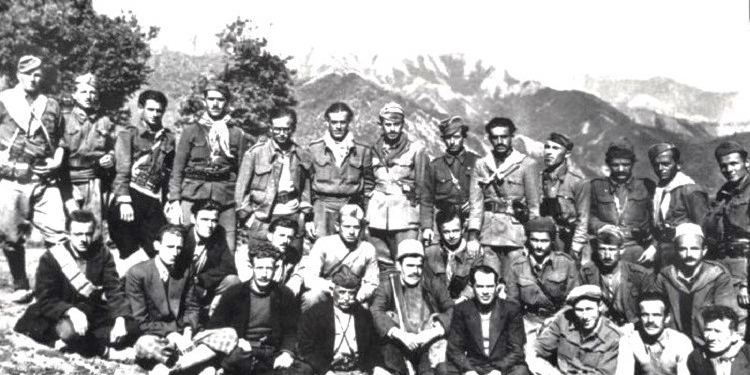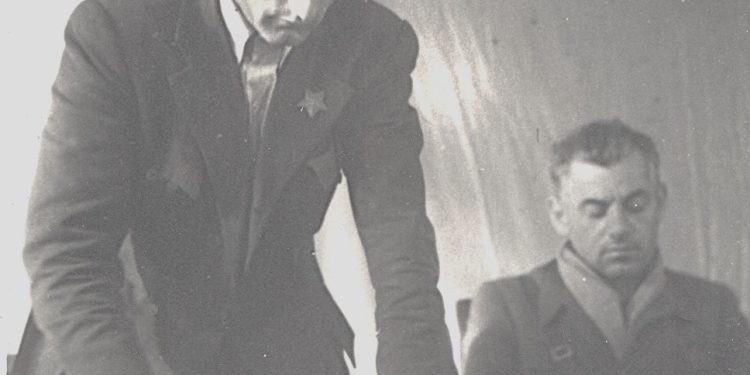From Prof. Assoc. Dr. Gjergj P. TITANI
Memorie.al / Ymer Dishnica (1912-1998) were one of the most charismatic, intelligent, noblest figures, and one of the main leaders of the Albanian Communist Party and the Anti-Fascist National Liberation War. He was born in the village of Dishnicë on February 21, 1912, 4 km away from the city of Korçë. Ymer Dishnica was a contemporary of national independence and a worthy son of a family with distinguished patriotic traditions, which gave Albania five martyrs, including one of Dr. Ymer Dishnica’s brothers. He was one of Albania’s most prominent Francophone anti-fascist activists. People like Ymer Dishnica possessed rare cultural, communicative, and persuasive propaganda qualities. He was capable of convincing dialogue with people of different natures and characters.
Educated in a rural, but also urban environment like Korçë, or a European one like Paris and France, he possessed astonishing persuasive abilities. An extraordinary agitator of the new anti-fascist type, Ymeri easily understood the plight of people from the village, the city, or foreign allies. He was not a submissive person and felt no complex of inferiority towards anyone, especially towards representatives of the allies. With representatives of the opposing right-wing forces, Dr. Ymeri conversed without threats or insults and was able to understand the difference between compromise and surrender.
He served as the Minister of Health in the first Albanian democratic government, a member of the Central Committee and the Political Bureau of the CPA, and a member of the General Anti-Fascist National Liberation Council. He was loyal to the anti-fascist and communist cause and to his convictions, which he had embraced long before the formation of the CPA, when he was in France. This distinguished personality of great capacity transcended the size of Albania with his intellectual and moral integrity. Later, Ymer Dishnica was expelled from the Central Committee and the Political Bureau of the CPA, thus beginning his long ordeal as a political persecuted individual.
Dr. Ymer Dishnica was elected a member of the General Staff of the Anti-Fascist National Liberation Army (LANÇ) on July 4, 1943, in Labinot, Elbasan. He began his primary education in his birthplace and finished it in Korçë, while his secondary education with excellent results was completed at the French National Lyceum in that city (1932). After this, Ymer Dishnica departed for France, where he would study medicine for eight years at the University of Lyon and later the University of Paris (1932-1941), graduating and specializing in pathology.
By nature, Ymer Dishnica was an intellectual with high cultural demands and capacities. During those years, he could not fail to visit the Tuileries and the famous Louvre Museum, as well as the many museums in Paris and other French cities. He studied the classical and modern architecture of France. He visited the numerous theaters and art galleries of the “capital of the world.” Parallel to his studies, he also visited the forests and parks in the outskirts of Paris, and the banks and beaches of the Seine River. But he was also a communist militant who embraced leftist ideas in anti-fascist France, which had risen up to defend freedom and democracy threatened by Italian fascism, Spanish Francoism, and German Nazism. In Europe, the smell of gunpowder and the roar of artillery and aviation were echoing.
During his stay in France, the young doctor was a member of the French Communist Party for eight years and a leader of the Albanian anti-fascist community. During his time in France, as one of the leaders of that community, together with Nako Spiru, Qamil Çela, Sejfulla Malëshova, Dhori Samsuri, Gogo and Kozma Nushi, and other comrades, he organized powerful protests in support of the Spanish people against Franco’s fascist rebellion and supported the Albanian volunteers fighting in Spain, such as: Mehmet Shehu, Skënder Luarasi, Petro Marko, Mane Nishova, Asim Vokshi, Justina Shkupi who worked in hospitals and infirmaries with the famous Dr. Béthune, the “Doctor of three continents,” and many others. There were even many martyrs among the Albanian fighters. Ymeri welcomed and saw off the Albanian volunteers to the front. He met Petro Marko first, and then the others. During the days of April 1939, when Italian fascist troops occupied Albania, Ymer Dishnica and his comrades, Albanian emigrants, workers, and students, numbering several hundred, organized powerful demonstrations and wrote strong protests and pamphlets in the Albanian and foreign emigration newspapers and magazines, and also published in the French anti-fascist press.
Being one of the veteran activists of the Korçë Communist Group, with a sound Western European culture, who maintained regular ties with the homeland, he returned to Korçë as a qualified doctor, but also as an experienced anti-fascist. He opened his private medical clinic before the CPA was founded. This clinic hosted more clandestine anti-fascist political activities and party working meetings with members of patriotic groups than medical visits. The Anti-Fascist National Liberation War of the Albanian people, a struggle for life or death, had begun. Very soon, the occupiers’ secret police tracked down Dr. Ymeri’s political activity, forcing him to go into deep illegality. He became involved in very intensive and dangerous work as a key figure in the leadership activity of the Korçë District and was co-opted as a member of the CPA Central Committee at this time.
At the First Anti-Fascist National Liberation Conference of Pezë, on September 16, 1942, Ymer Dishnica, as a delegate of the CPA, played a crucial organizational role, especially in mutual relations with nationalist figures. In Pezë, he was elected a member of the Provisional General National Liberation Council. During this time, Ymer Dishnica powerfully displayed all his intellectual and organizational-theoretical talents and capacities. At the First National Conference of the CPA (1943), he distinguished himself for his brilliant oratorical skills. On July 4, 1943, in Labinot, Elbasan, Dr. Ymeri was elected a member of the General Staff of the LANÇ.
In the important meeting of Mukje, which began its work in Ihsan Toptani’s house in the Plain of Tirana, where later the English Colonel Nichols, seriously wounded in the leg, was also sheltered (where he died as a result of incurable gangrene), and then continued its work in August 1943 in Mukje. Ymer Dishnica, chairman, Mustafa Gjinishi, and a large delegation representing the left forces and the National Liberation Front, and ‘Balli Kombëtar’ (National Front) was headed by Mit’hat Frashëri and an equally large delegation, discussed at length the issues of the joint war against the occupier and ethnic Albania, which clashed with the aims of Miladin Popović and Dušan Mugoša as emissaries of the Yugoslav Communist Party and Josip Broz Tito to the Central Committee of the CPA, which directed the War in Albania.
It was precisely for his correct stance at this meeting that only Dr. Dishnica was accused of opportunism and punished, even though the left delegation included several other highly influential personalities of the LANÇ and remained faithful to the platform approved by the CPA Central Committee. At the Plenum of Helmës (May 1944), where not even half of the members of the Permanent Central Committee of the CPA were present, which constitutes a serious procedural violation of the party organs and a premeditation to accuse and punish only Ymer Dishnica!
Nevertheless, the LANÇ continued, and this wise and distinguished personality continued to be heavily involved in its organs. He led the sectors he was entrusted with and, together with his close friend, Professor Sejfulla Malëshova, they gave life and cheer to every gathering or political activity of the LANÇ, with their cheerful and intellectual demeanor. At the First Anti-Fascist National Liberation Congress of Përmet (May 1944), he was elected a member of the Anti-Fascist National Liberation Committee for Health, which had the attributes of a Provisional People’s Government.
On October 22, 1944, in the city of Berat, he was appointed Minister of Health of the Democratic Government of Albania, which entered liberated Tirana on November 28, 1944. Parallel to the daily and very busy work and activity, as everything in social life in Albania was being rebuilt from scratch, he, together with Professor Sejfulla Malëshova, Dr. Ymer Dishnica, Dhimitër Shuteriqi, the poet Mark Ndoja, the publicist Shefqet Musarai, the writer Petro Marko, but also with Father Vinçens Prenushi, Andrea Xega, Dhimitër Pasko, Nexhat Hakiu, Sterjo Spasse, Vedat Kokona, Selaudin Toto, etc.- some of whom were later imprisoned and persecuted-created the League of Writers for the first time in Albania and decided to publish the magazines “Bota e Re” (The New World), “Letërsia jonë” (Our Literature), etc. This community did not originate only from the CPA and the LANÇ or the left, as a sectarian attitude had been shown until then, which was true.
Precisely during those days, Sejfulla Malëshova, together with Dr. Ymer Dishnica, waited until midnight in the “Kosova” Cinema hall for the world-famous Soviet writer, Ilya Ehrenburg, who was accompanied by the French-speaking playwright, Hetem Haxhiademi. But this spark of democracy and social freedom, such as the League of Writers of Albania, the Trade Unions or Professional Associations, the Albania-Russia Friendship Association (which initially had as chairmen the Albanian Deputy Prime Minister, General-Lieutenant Koçi Xoxe, Political Bureau member Nako Spiru, Hysni Kapo, Tuk Jakova, and others), was quickly extinguished by the dictatorial regime.
In 1947, for purely political reasons, Ymer Dishnica was dismissed from the post of Minister of Health and placed at the disposal of the Ministry of Foreign Affairs, in a last-rate job-this brilliant intellectual and anti-fascist. At his request, the doctor definitively gave up politics, donned the white coat of a pathologist, and began working at the Tirana hospital (1948) and teaching at the medical high school. On January 2, 1950, by a special decision, he was deported with his family from Tirana to Berat, where he worked as the director of the Health Service Directorate, in the city hospital and ambulance.
In June 1955, ironically, by order of the head of the party pyramid himself (Enver Hoxha), he was arrested and sentenced to six years in prison, accused of “agitation and propaganda against the state”!!! After one year, with the intervention of the man who financially supported the creation of the CPA a great deal, his uncle, Esat Dishnica, his remaining sentence was pardoned (!), but this “pardon” was accompanied by another inhuman decision by the Commission of Deportation-Internments. This murderous Stalinist-Enverist organism interned Dr. Dishnica in the city of Berat for a five-year period. Ymer Dishnica, although interned, i.e., politically persecuted, was the most valued most respected person by the common people of the city and his many patients. Nonetheless, he remained isolated and strictly supervised by the State Security organs with his family until the overthrow of the dictatorship of Enver Hoxha and his clique.
Dr. Dishnica, in the meantime, was very careful, studied and read advanced professional literature of the time, but also followed the political situations of the continent with attention and caution. He felt the great hope of democracy and political and social freedom, which, although very late, was finally coming to Albania. The great Albanian personality Ymer Dishnica was finally able to return freely to Tirana in 1995, tired but optimistic. Persecuted, but unbowed by the long oppression.
In 1994, despite his advanced age, he was elected Chairman of the United Organization of Veterans of the Anti-Fascist National Liberation War of the Albanian People. Unreconciled with the dictator. Why? Because Dr. Dishnica’s divergences with Enver Hoxha had begun very early and were irreconcilable. The dictator could not tolerate collaborators like personalities of Ymer Dishnica’s type, with exemplary integrity and independence of thought, so he eliminated or physically crippled them, one by one, but he could never morally defeat them, not even when he imprisoned them for a long time or physically eliminated them.
As a result of his extraordinary anti-fascist and wartime activity, Dr. Dishnica was elected a Member of the People’s Assembly since the first legislature and honored with many orders and medals of the People’s Republic of Albania and other allied countries. The esteemed Dr. Ymer Dishnica died peacefully among his family, respected by relatives, friends, comrades, veterans, and fighters of the LANÇ, on September 22, 1998. Albanian society thus lost an emblematic, educated, schooled, devoted, and highly cultured man, who will be remembered for a very long time and will occupy a well-deserved place in the pantheon of honor of the Albanian nation.
The author of this biographical study is one of the younger veteran pioneers of the LANÇ, and his parents had the happy opportunity to know this distinguished and unique personality of the LANÇ very closely, and they considered him an honored family friend since he returned from his university studies in France and a colleague of his parents, who were also anti-fascist fighters from the earliest hours, from before the fascist occupation until the moment Dr. Ymer Dishnica passed away. / Memorie.al















